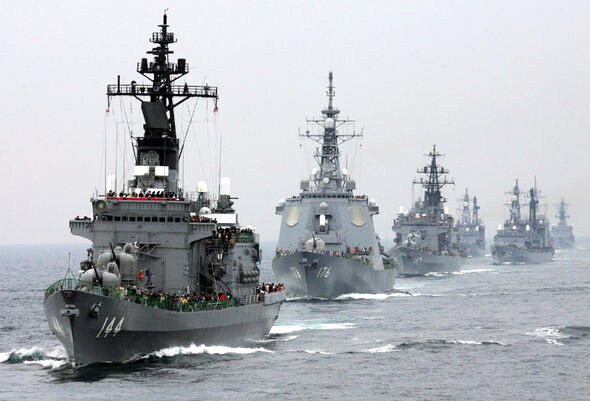hankyoreh
Links to other country sites 다른 나라 사이트 링크
New rule to require Japan to receive consent before entering overseas conflicts

A new rule will require the Japan Self-Defense Forces (JSDF) to receive prior consent from any third country it enters to provide rear-area support or other “response measures.”
The addition is Tokyo’s signal that the JSDF will not engage in rear-area support to South Korean forces without their government‘s consent even if the need arises due to an emergency on the Korean Peninsula.
Japan’s ruling coalition of the Liberal Democratic Party and Komeito held a “council on security legislation revision” at the National Diet on May 10 and reached a final agreement to amend ten related laws, including the JSDF Law and Law on Contingency Situations in Areas Surrounding Japan (“Situations Law”), local news outlets reported on May 10.
The coalition also agreed to enact a general “support law for international peace” that would allow the JSDF to provide rear-area support to multinational forces at any time.
The main focus of attention in South Korea has been on the Situations Law - soon to be renamed the “Law on Situations with Important Influence on Japan” - which some have suggested could be invoked in the case of an emergency on the peninsula.
Article 2, Item 4 of the amended Situations Law states that “response measures toward foreign territories will be limited to such times as consent exists from the country in question.”
The US-Japan defense cooperation guidelines amended on Apr. 7 stated that Japan would act “in accordance with international law, including full respect for sovereignty” of any third country - although South Korea was not mentioned by name, causing some to protest that Seoul’s prior consent had not been stipulated.
Because the guidelines are not a treaty with binding legal force between the US and Japan, the JSDF would be able to act in accordance with domestic laws enacted in the “spirit” of the guidelines in a real situation. The latest measure makes it clear in the Situations Act, which is an example of such a domestic law, that any third country’s consent would be needed for the rear-area support or other response measures by the JSDF.
But some questions remain over how Seoul’s consent would be offered, since operational wartime control (OPCON) would pass from the South Korean President to the USFK commander in the event of an emergency on the Korean Peninsula.
The new law also expands the range of JSDF rear-support activities from areas neighboring Japan to the rest of the world, as indicated at the time of the guidelines’ revision, and permits the forces to engage in previously banned activities such as supplying ammunition and fueling fighters while they standby awaiting scrambling. Meanwhile, the new “support law for international peace” would enable Japan to send the JSDF into overseas conflicts to provide rear support whenever it chooses. Even some observers within Japan have worried that the permissions could cause Japan to suffer needlessly from being drawn into US conflicts.
By Gil Yun-hyung, Tokyo correspondent
Please direct questions or comments to [english@hani.co.kr]
Editorial・opinion
![[Guest essay] Maybe Korea’s rapid population decline is an opportunity, not a crisis [Guest essay] Maybe Korea’s rapid population decline is an opportunity, not a crisis](https://flexible.img.hani.co.kr/flexible/normal/500/300/imgdb/original/2024/0430/9417144634983596.jpg) [Guest essay] Maybe Korea’s rapid population decline is an opportunity, not a crisis
[Guest essay] Maybe Korea’s rapid population decline is an opportunity, not a crisis![[Column] Can Yoon steer diplomacy with Russia, China back on track? [Column] Can Yoon steer diplomacy with Russia, China back on track?](https://flexible.img.hani.co.kr/flexible/normal/500/300/imgdb/original/2024/0430/1617144616798244.jpg) [Column] Can Yoon steer diplomacy with Russia, China back on track?
[Column] Can Yoon steer diplomacy with Russia, China back on track?- [Column] Season 2 of special prosecutor probe may be coming to Korea soon
- [Column] Park Geun-hye déjà vu in Yoon Suk-yeol
- [Editorial] New weight of N. Korea’s nuclear threats makes dialogue all the more urgent
- [Guest essay] The real reason Korea’s new right wants to dub Rhee a founding father
- [Column] ‘Choson’: Is it time we start referring to N. Korea in its own terms?
- [Editorial] Japan’s rewriting of history with Korea has gone too far
- [Column] The president’s questionable capacity for dialogue
- [Column] Are chaebol firms just pizza pies for families to divvy up as they please?
Most viewed articles
- 1Under conservative chief, Korea’s TRC brands teenage wartime massacre victims as traitors
- 2[Guest essay] Maybe Korea’s rapid population decline is an opportunity, not a crisis
- 3Value of Korean won down 7.3% in 2024, a steeper plunge than during 2008 crisis
- 4[Column] Can Yoon steer diplomacy with Russia, China back on track?
- 5Two factors that’ll decide if Korea’s economy keeps on its upward trend
- 6First meeting between Yoon, Lee in 2 years ends without compromise or agreement
- 7Months and months of overdue wages are pushing migrant workers in Korea into debt
- 8‘We must say no’: Seoul defense chief on Korean, USFK involvement in hypothetical Taiwan crisis
- 9After election rout, Yoon’s left with 3 choices for dealing with the opposition
- 10Why Kim Jong-un is scrapping the term ‘Day of the Sun’ and toning down fanfare for predecessors